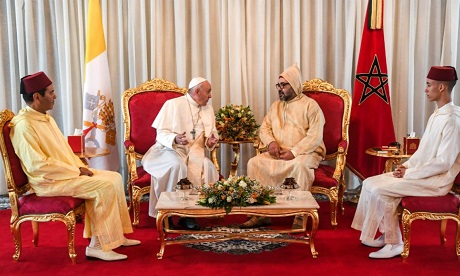Pope Francis’s meetings in Morocco have underlined the importance of religious liberty and its connection to the dignity and rights owed to every person, regardless of their religion.
On Saturday, the first day of a two-day trip, he told Morocco’s Catholic community they should avoid attempting to convert Muslims.
Instead, he suggested they should seek to have good ties with people of all faiths.
“Christians are a small minority in this country. Yet, to my mind, this is not a problem, even though I realize that at times it can be difficult for some of you,” he said at a meeting with Catholic community leaders in Rabat’s cathedral.
“The Church grows not through proselytism but by attraction,” Francis said to applause.
“This means, dear friends, that our mission as baptised persons, priests and consecrated men and women, is not really determined by the number or size of spaces that we occupy, but rather by our capacity to generate change and to awaken wonder and compassion,” he said.
Francis backs Morocco’s efforts to promote a moderate version of Islam.
“We believe that God created human beings equal in rights, duties and dignity, and he calls them to live as brothers and sisters and to spread the values of goodness, love and peace,” he said.
“That is why freedom of conscience and religious freedom, which is not limited to freedom of worship alone, but allows all to live in accordance with their religious convictions, are inseparably linked to human dignity.”
In response, Morocco’s King Mohammed VI underlined the importance of education to tackle radicalism.
He said the three Abrahamic religions (Judaism, Christianity and Islam) were created “to open up to one another and to know one another.”
Religions offer venues to fight against radicalism through knowing one another, which will help rise to the challenges of our tormented times through education, the king said.
“To tackle radicalism, the solution is neither military nor financial; that solution has but one name: Education.”
The monarch noted that in the face of ideology-linked violence and extremism prevailing in many parts of the world today, “it is clear the dialogue between the Abrahamic religions is insufficient.”
He pleaded for rethinking the role of education in the struggle against extremism.
The king says ignorance, or erroneous interpretation of the peaceful and humanity-celebrating messages of religions, is the primary source of many of the problems facing the world.
“My plea for education is an indictment of ignorance. It is binary conceptions and the fact of not knowing one another well enough that are threatening our civilisations; it is certainly not religion.”
When taught, understood, and practised as recommended in the scriptures, religion can be a source of blossoming relations between people and countries, he said.
On Sunday when celebrating Mass, Francis told the congregation that he encourages them “to continue to let the culture of mercy grow, a culture in which no one looks at others with indifference, or averts his eyes in the face of their suffering.”
The languages used at the Mass reflected the fact that the Catholic community in Morocco is made up almost entirely of foreigners. The readings were in Spanish, Arabic and French; English, Portuguese and Italian were added for the prayers of the faithful.
More than a dozen Muslim leaders attended the Mass in a sign of friendship and were given seats near the front of the arena.
Source
- Morocco World News
- DW
- Reuters
- America Magazine
- Catholic News Service
- Catholic Herald
- Image: France 24
News category: World.




